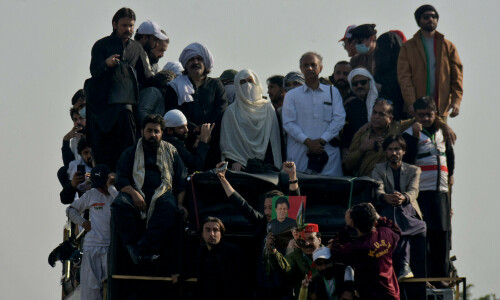
DAVOS, Jan 22: President Pervez Musharraf on Thursday voiced optimism over the possibility of peace in Kashmir. Addressing business and political leaders at the World Economic Form, Gen Musharraf said : "My optimism is based on the fact that for the first time there is a realization that we need to address all issues, including the issue of Kashmir, to bring peace and harmony to the region".
For progress, he maintained, there was a need of the "initiation of a composite dialogue" on all issues, including Kashmir. "I am very hopeful, that with sincerity and resolve on both sides we will address all issues," he said.
The president sought to reassure that Pakistan's nuclear arms would never slip into the wrong hands. "Pakistan's nuclear assets are in extremely safe hands and they will never be allowed to fall into the hands of extremists."
Talking to reporters, the president said that Pakistan was investigating a "definite possibility" of Al Qaeda's involvement in two attempts to assassinate him last month.
"We have unearthed a lot. We have, in fact, netted all the people directly involved in the action but we are trying to see who was behind them...the real links, as they say," said Gen Musharraf.
"We think that yes, there is a definite possibility of some Al Qaeda (men operating) in the rear," he added. "We are now trying to see the linkage with our (Pakistani) extremist organizations, we need to establish that still."
Rejecting the theory of a clash of civilizations, he said attention needed to be focused on the root causes leading to extremism and terrorism. "What leads to extremism? Militancy, unresolved political disputes, poverty, illiteracy... all this combined are a fodder for extreme religious indoctrination," he said and added "we need to attack the sources of extremism."
The president said his vision for security structure was his theory of Enlightened Moderation which, he added, was a solution to this malice. He said the two-pronged theory on the one hand called upon the Muslim world to reject extremism and to go for socio-economic development.
On the other, he said, it called upon the West, the United States and UN to move forward for socio-economic emancipation of the Islamic world by resolving political disputes involving Muslims.
Gen Musharraf referred to causes leading to mis-perceptions among Muslims that Islam was being targeted, while the West felt that Islam was a religion of militancy, extremism and intolerance.
He said it was hoped that the end of the Cold War would usher in an era of peace and stability but it did not. The disputes of Palestine and Kashmir were festering wounds, he added.
The theory of clash of civilizations further complicated things, he said. "Like any religion," he emphasized, "Islam preaches moderation, justice and equality and does not preach extremism and militancy."
He said the Western media projected two extremes when Islam was debated. Religious bigots were brought to media who gave extremist views on our religion. On the other hand, ultra modern personalities condemned their own customs, culture and religion to appease the West.
"The vast majority of the moderates remain out of the loop, and are seen by the West as extremists. Islam is seen through the eyes of extremists from both sides," Gen Musharraf pointed out.














































Dear visitor, the comments section is undergoing an overhaul and will return soon.